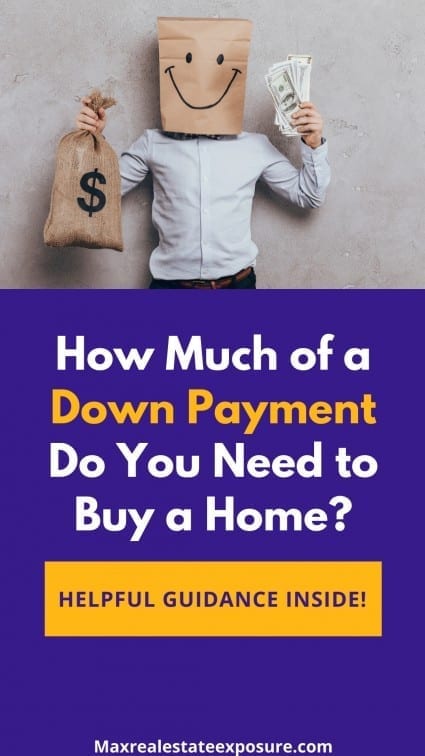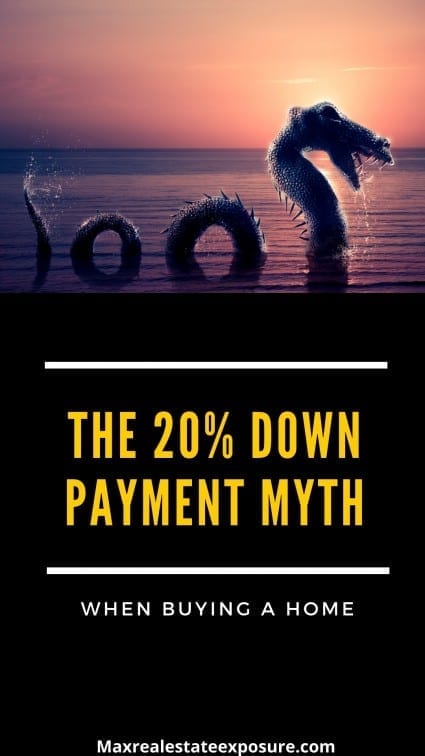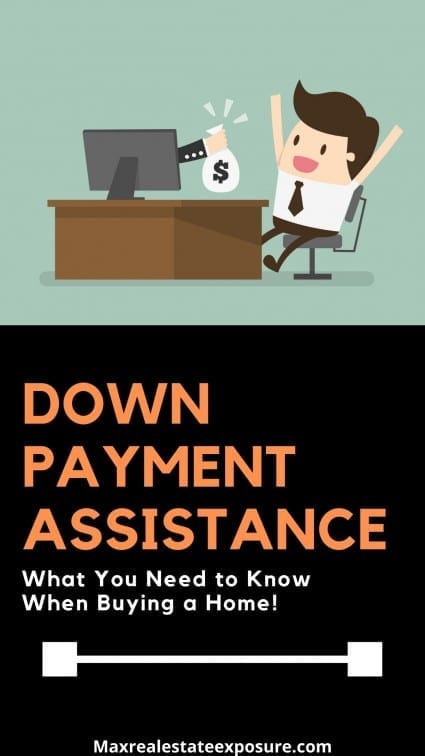What Are The Down Payment Requirements When Buying a Home?
 What do you need for a house down payment? This is one of the first questions potential homebuyers ask for a good reason.
What do you need for a house down payment? This is one of the first questions potential homebuyers ask for a good reason.
Understanding how much of a house down payment is needed is essential for any home buyer.
The house down payment is where most of the money goes for most homebuyers – you don’t have enough to pay cash for the home and need a loan, so you plan to put as much of your savings down as you can to make the purchase happen.
But the old days of everyone making a 20% down payment are long gone.
You may need to make a down payment to buy a home, but how much depends significantly on your circumstances and goals.
Down payments for houses have been a misunderstood topic among consumers for as long as I can remember.
Keep reading to discover many facts about down payments you probably didn’t know.
Understanding what to know about down payments is essential for first-time home buyers.
What is a Down Payment?
A down payment is a sum prospective home buyers typically shell out when buying real estate.
A down payment is a portion of the total purchase price, and buyers will get a mortgage to finance the remainder.
Down payments can vary based on the buyer’s loan program, preferences, and real estate market conditions.
The requirements for house down payments are typically based on your mortgage type. The type of property can also impact down payment amounts.
For example, there can be differences in the requirements for primary residences vs. investment properties.
What to Know About House Down Payments
House down payments is a topic that many people have misconceptions about.
Most first-time homebuyers think about the minimum down payment they need to buy a house. While it was once typically 20%, today’s home prices are high enough that 20% is merely unreachable for most first-time homebuyers.
The requirement of a twenty percent house down payment is a mortgage myth long gone by the wayside.
Many people have been fooled into thinking the down payment requirements to buy a home are more significant than reality.
Fortunately, many loan programs for first-time buyers offer ways to get a home with less than 20%, often far less.
Look at the detailed summary of loan programs and their minimum money-down requirements. The amount of funds you need to put down depends on your loan type.
You can still buy a home today with no funds to put down.
What is The Average Down Payment For a House?
The average down payment for a home differs whether you are a first-time buyer or have purchased one. The average for a first-timer is around 6 percent, while the standard for others is about 11 percent.
The Benefits of a Higher Home Down Payment
There are many advantages of putting more money down. For one, your monthly mortgage payment will be lower when your loan amount is smaller.
A smaller payment amount will allow you to put the money saved elsewhere.
Mortgage lenders will also give you more favorable terms when you have a sizeable down payment. A large mortgage loan brings with it a higher interest rate. Your mortgage rate will also be more advantageous with a good credit score.
Lenders love seeing a healthy loan-to-value ratio as it lessens their lending risk. An additional benefit of more money down occurs when bidding in a competitive real estate market.
Any real estate agent will tell you sellers and agents prefer buyers who have more money down. Right or wrong, a low down payment often makes sellers uneasy.
Additionally, with more money down, the odds become lower there will be appraisal problems. Lenders can feel more comfortable loaning money on your new home with a higher value ratio.
In the long run, many good reasons exist for a more significant down payment.
How Much Down Payment on a House is Required Based on Loan Types
Here are the minimum down payment requirements for the most common mortgage programs. There are quite a few loan options available today.
The down payment on a house can vary based on your chosen loan.
Down Payment Requirements For Conventional Loans
A conventional loan is a mortgage you get when you walk into a bank or credit union – or apply online – and go for standard financing.
They are usually fixed-rate loans, which means the interest rate will remain the same throughout the loan’s life, and they can vary significantly on what type of down payment you need.
However, many require as little as 3% down, usually within reach of most homebuyers. Fannie Mae and Freddie Mac typically sponsor these mortgages.
Down Payment Requirements for FHA Loans
The Federal Housing Administration has programs that make it easier for those that qualify to buy homes. They require a minimum of 3.5% down, and you must be eligible for the loan program.
If you earn average or below-average income and you are a first-time homebuyer, there is a good chance you could be eligible.
However, be aware that there are some restrictions and hoops you may have to jump through to purchase a home.
Regarding house down payments, FHA loans are attractive because of the smaller amount of money you’ll need to put down. This type of mortgage is one of the most popular among first-time home buyers.
Down Payment Requirements For VA Loans
VA mortgages are available to current and past armed forces members and offer some of the best deals for homebuyers.
The rates are competitive, and the terms are excellent for those that qualify, including requiring zero down. Yes, if you are eligible for a VA loan, you can purchase a home without needing any money down.
Borrowers should know a VA funding fee and other closing costs associated with this mortgage.
Down Payment Requirements For USDA Loans
The rural loan is also another no-money-down option. The property needs to be in a rural area with certain income restrictions.
Get a helpful understanding of USDA loan requirements here. USDA mortgages are one of the few programs where the down payment for a house can be zero.
Yes, you read that correctly – no money down! However, the requirement of being in rural areas makes this type of loan not attainable for buying in the city or highly populated suburbs. You can check with the lender for eligibility requirements.
The mortgage process can be slightly longer with a federal government loan program, which could slightly extend the closing time frame. Having these down payment options, however, is worth it.
When is a Mortgage Down Payment Due?
You do not need to provide your down payment until the home’s closing.
Why Do You Hear About 20% Down on a House So Often?
 The 20% down idea has been around for a long time – and for a good reason. Putting down 20% of a home’s value you will purchase places you in a strong position as a homebuyer.
The 20% down idea has been around for a long time – and for a good reason. Putting down 20% of a home’s value you will purchase places you in a strong position as a homebuyer.
You look better to lenders since they know you are investing a significant portion of your money into the property.
That means you can usually get better loan terms, like lower interest rates.
You might call this putting yourself in the perfect position to buy a home, like getting a free credit report and checking it for errors, so you’re not penalized.
Lenders Prefer More Money Down
Lenders still love buyers that put 20% down, so if you have the money to spare, you might consider investing.
If your down payment on a house is not 20%, you must pay private mortgage insurance (PMI), which can add a hefty chunk to your monthly costs.
PMI is required as insurance against defaulting on your mortgage. If you don’t pay your mortgage and lose the home, the lender will still get paid through the PMI.
Remember that even if you have to pay PMI, you can reach a point where you no longer have to carry the insurance – once you get 20% equity in your home.
However, don’t assume that the mortgage or insurance company will remind you that you no longer have to pay PMI.
You will likely need to contact someone to tell them you are at 20% equity and ready to cancel your private mortgage insurance.
Given the high costs of PMI, having a higher down payment for a house could be ideal. There are others ways you can avoid paying PMI too.
Should You Make a 20% House Down Payment If You Have It?
What should a house downpayment be? Whether you should have a down payment for a house that equals twenty percent always comes up.
Everyone’s financial situation is different, so it is impossible to say precisely what everyone reading this article should do.
Is paying 20% down helpful? Sure. Is it always the best idea? Not necessarily. Sometimes you are better off putting a smaller amount down to maintain overall financial stability.
Consider a homebuyer with just enough savings to put 20% down on the house. While they may want to put 20% down because it means they’ll own as much of the home as possible and want to beat out other potential buyers, they could be in trouble if they get the house but have no savings left over.
What if the water heater and the furnace break in the first month after they move in? They can’t rely on the landlord to fix it since they are the ones that own the house.
Instead, they will have to wait until they can figure out how to replace the water heater and furnace – when if they had set aside some savings and made less of a home down payment, they would have had enough money to enjoy their house in comfort.
Plenty of loans can be had for less than 20% down. If you can only put 10% or 15% down, you can find a lender that will work with you. And if you can only put 3% down, you can likely find a lender that will also work with you.
Only put down as much money as you can afford while still taking care of all your other needs – like a safety net for repairs on the home.
Down Payment Assistance Programs
 Even if you qualify for a 3% down payment on a home, that could still be over $10,000 or more, depending on your area and housing needs.
Even if you qualify for a 3% down payment on a home, that could still be over $10,000 or more, depending on your area and housing needs.
If you don’t have that kind of money in your savings, you may need to figure out another way to get it.
Some common ways people get their house down payments include the following:
It is possible to find a down payment assistance program.
Several different down payment assistance programs exist for home buyers, particularly first-time homebuyers.
They are usually restricted to those in certain income brackets and with specific credit scores, but they are available if you qualify.
The Department of Housing and Urban Development is one place to seek a first-time homebuyer grant. It is the most well-known down payment assistance program.
You can also sell assets to come up with more down payment funds.
You may have a collection that you can sell, a nice car, other property, etc. if you have any significant investments or costly items that you are willing to part with, you could sell them to get your money to put down.
Down Payment Gifts Are an Option
Can house down payments be a gift? Yes! Many first-time homebuyers get some or all of their down payment from their parents or other family members.
If this is an option for you, don’t hesitate to take advantage of it if it makes sense. However, be aware that you may have to account for the gift if you are trying to qualify for a home loan.
See what you need to know about down payment gifts. If you have a family member who can help, it’s not a bad idea.
Retirement Accounts Could Fund a Down Payment
If you have a retirement account with sufficient funding, you could take out some or all of that money to fund your home purchase. You want to be careful since you may incur fees and penalties if you take this option.
First-time homebuyers do get a $10,000 exemption from such penalties, however.
Many people ask if they can use their 401k for a down payment. The answer is you can, but withdrawing money from a 401k before 59 1/2 will result in a 10% early withdrawal penalty and paying taxes.
Doing so is usually not the best idea as it costs you significant money and disrupts your retirement account.
Put The House Down Payment Money Elsewhere
What if down payment monies are not an issue, and you have a choice? Some financial advisors will tell their clients to put less money down when interest rates are attractive.
The theory is that homeowners should use that money elsewhere to invest rather than tying it up in their homes.
For example, let’s say you were purchasing a $500,000 home. The difference between putting five percent down vs. twenty percent is $75,000.
Would you be better off financially investing that money in the stock market? Some financial experts would say yes.
It may be worth bending their ear for advice if you have a financial advisor. Everyone’s financial goals differ, so speaking to a professional could be worthwhile.
Everybody has an opinion on how much money to put down is best. Many people will tell you there are downsides to putting more money down than you need to.
Sellers should understand that a buyer with a lower down payment does not necessarily mean they are less qualified than a buyer with a larger down payment. Sometimes it is by choice.
A buyer’s agent should clarify that when submitting an offer for their client. Without a doubt, there can be stigmas with some real estate agents on how much of a down payment you should have for a home purchase.
Don’t Confuse Earnest Money Deposits With a Home Down Payment
When you are looking for a home to purchase and eventually find one, you must give what’s known as earnest money or a house deposit. An earnest money deposit is the funds you commit to “lock up” a property.
The seller will want to know you’re serious about purchasing their home. You do that by putting earnest money into an escrow account at the time of your offer, which the seller’s real estate brokerage typically holds.
Quite often, buyers confuse their down payment with earnest money. They are not the same things. Your home down payment is the money you put up and not borrowing from the lender.
The earnest money will become part of your down payment, but it is different. Earnest money generally ranges from one to five percent of the home’s purchase price.
Your earnest money is accounted for at the time of the closing. For example, if you put five percent into a broker’s escrow account and borrow eighty percent, you would come up with fifteen percent at the closing time.
Recap of The Advantages of a Larger Down Payment When Buying a Home
 Right or wrong, there are some distinct upsides to putting down more money when purchasing a house. They include the following:
Right or wrong, there are some distinct upsides to putting down more money when purchasing a house. They include the following:
- Sellers favor buyers that put down a larger down payment when there is a bidding war. As previously mentioned, whether they should is a different argument.
- Your monthly payment will be lower if you put down at least twenty percent, not only because you won’t be paying PMI but because you’ll be paying interest on a smaller amount.
- Some lenders will give you more favorable mortgage terms, including a lower interest rate when you put more money down on your primary residence.
Choose The House Down Payment That Works For You
You are qualified to decide what type of home is best for your needs.
Although it can be tempting to try and put everything you have down, hold back long enough to verify that you are making a sound financial decision.
Down payments for houses are a substantial amount of money. Doing what makes you comfortable and allows you to sleep at night makes the most sense.
Having some money left over in an emergency fund would be best.
If you have student loan debt or credit cards with high balances, that might also be an excellent reason not to max out the money you put down on a home.
Understanding how much you need to put down to buy a home is vital. Unfortunately, many buyers have had a false impression that they needed more than they did. Relying on outdated information has probably put off purchasing real estate for many buyers.
Use a Down Payment Calculator
You can use a calculator for down payments. Many online down payment calculators will help you plan for your mortgage payments.
You can plug in your desired amount, closing costs, interest rate, and loan term. You can use the down payment calculator to estimate what you can afford.
Frequently Asked House Down Payment Questions
1. What is the average down payment on a house?
The average down payment on a house in the US is around 6 percent.
2. How much should a first-time homebuyer put down on a house?
The amount of money a first-time buyer should spend depends on each individual’s financial circumstances. If you or the property you’re interested in qualifies, you can put no money down.
Borrowers can also get a conventional mortgage with as little as 3 percent down. With an FHA mortgage, you need 3.5% down.
3. Can you buy a home with only 3 percent down?
As mentioned, conventional mortgages are available with as little as 3 percent down. Needing 20 percent down to purchase a home is a mortgage myth.
4. What is the downside of not having a house down payment?
When you don’t have a down payment, some home sellers may be more reluctant to accept an offer. Without any money to put down, a seller has no earnest money.
This situation leaves them vulnerable if a buyer backs out of the transaction. Some sellers also look at a lack of down payment as not being a qualified buyer.
Other Valuable Mortgage Resources
Read these additional articles to answer more of your financial questions.
- What does Credit Karma do – lots of people have heard the advertisements for Credit Karma and wonder exactly what purpose they serve. A short description would be a company that puts you in a better financial position to achieve your goals. They offer tremendous value by providing helpful information that’s trustworthy to build your credit.
- Questions I should ask the lender – when getting a loan to purchase a home, it is imperative to ask the right questions to make the best possible choices. The article offers excellent guidance on what you should ask and get the correct answers.
- Should I pay off my mortgage early – those who have come a long way financially often wonder if it makes sense to keep their mortgage. Get sound guidance on the pros and cons of paying off your mortgage before it becomes due.
These resources are loaded with trustworthy tips on following sound financial advice.
About the author: Bill Gassett, a nationally recognized leader in his field, provided the above Real Estate information on how much is a down payment for a house. Bill can be reached via email at billgassett@remaxexec.com or by phone at 508-625-0191. Bill has helped people move in and out of Metrowest towns for 37+ years.
Are you thinking of selling your home? I have a passion for Real Estate and love to share my marketing expertise!
I service Real Estate Sales in the following Metrowest MA towns: Ashland, Bellingham, Douglas, Framingham, Franklin, Grafton, Holliston, Hopkinton, Hopedale, Medway, Mendon, Milford, Millbury, Millville, Natick, Northborough, Northbridge, Shrewsbury, Southborough, Sutton, Wayland, Westborough, Whitinsville, Worcester, Upton, and Uxbridge MA.

